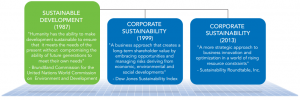This website uses cookies so that we can provide you with the best user experience possible. Cookie information is stored in your browser and performs functions such as recognising you when you return to our website and helping our team to understand which sections of the website you find most interesting and useful.
September 30, 2016
Corporate Sustainability 2016: An Unprecedented Opportunity & Moment for CRE
This article was originally published in CoreNet Global’s September 2016 edition of LEADER Magazine. For the complete magazine, see here.
As CoreNet Global convenes its 2016 North American Summit under the banner of “The Bigger Picture: Geopolitics, Economics & the Environment” in the City of Brotherly Love, top executives in corporate real estate (CRE) are recognizing that the growing, global, movement toward “corporate sustainability” has created a remarkable opportunity for CRE to offer C-suite visible strategic leadership. As the lead presenters of CoreNet Global’s excellent Sustainability Strategies: Impact on Corporate Real Estate Portfolios MCR seminar observed, “Sustainability creates an unprecedented opportunity for CRE.”1 Sustainability Roundtable, Inc. (SR Inc) management research with dozens of leading CRE departments makes it clear, however, that before CRE can seize this unprecedented opportunity, three things must happen:
- CRE leaders need to understand what corporate sustainability is and what it is not;
- CRE leaders need to recognize why the so-called “sustainability megatrend” has evolved in 2016 toward an issue of compliance world-wide; and
- CRE leaders need to step up to lead what can be a no-new-cost, change-management process driving substantial incremental savings while making CRE’s traditional continuous-optimization efforts strategic through greater visibility and relevance to top customers, talent, investors and regulators increasingly concerned about sustainability.
First, let’s define corporate sustainability
Research shows that corporate managers in general and middle managers in particular are far behind the C-suite and investors in understanding the value of corporate sustainability.2 According to a joint 2016 MIT Sloan Business School and Boston Consulting Group study, 80 percent of institutional investors care about a company’s sustainability efforts (while 31 percent of middle managers think investors care). This lack of understanding extends well into the CRE profession until, SR Inc has found, CRE professionals come to understand what corporate sustainability is; at that point, it’s increasingly embraced across sectors and geographies. It is also understood that CRE is vitally important in helping companies “walk the walk” in the move to greater corporate sustainability.

In 2013, SR Inc worked with dozens of Charter Members to define corporate sustainability as “a more strategic approach to business innovation and optimization in a world of rising resources constraints.”3 This definition is aligned with the longer and more detailed definition that the Dow Jones Sustainability Indices first published in 1999, which defined corporate sustainability as: “A business approach that creates long-term shareholder value by embracing opportunities and managing risks deriving from economic, social and environmental developments.”
The first three words of the Dow Jones Sustainability Indices definition, “A business approach…” make it clear that corporate sustainability is quite distinct from the United Nations’ commitment to advancing “sustainable development,” which is focused on making generations of global development possible. It is also distinct from “environmental sustainability” or “corporate social responsibility.”
Aligning with the sustainability megatrend
In 2010, Dan Lubin of the Sustainability Network and Dan Esty of the Yale School of Management wrote that sustainability was a “megatrend” similar to mass production, the Total Quality Management (TQM) movement, and the IT revolution. They suggested that it constitutes a fundamental, cross-markets change of context that companies need to align with or risk perishing. If they fail, they may suffer greatly as GM did when TQM remade manufacturing or, perish as Kodak did in the still-unfolding digital revolution.
Beyond the United States, the science of climate change is not controversial and the understanding of the risks it poses to political stability and global supply chains is growing. Thus, influenced by strategists from the most selective business schools and consultancies, as well as their own modeling, it is not surprising that global C-suites are aligning with the sustainability megatrend. Accenture partnered with the U.N. Global Compact to survey more than 1,000 global CEOs across 27 industries three times in six years and found 93 percent of them think sustainability issues will be “key to their future business success.” In 2013, research found that 63 percent of CEOs felt sustainability-related issues would “transform their industry” within five years.
Global capital markets have also gotten the message. Given a “fuller cost accounting” that provides investors with a broader view than financial accounting alone, the consideration of a company’s management of environmental, social and governance (ESG) issues in investment decisions has been dramatic.4 The amount of capital now managed in funds that explicitly consider ESG issues when investing has grown to an astonishing $21 trillion.5 The non-profit that seeks to rationalize this burgeoning global market is the Sustainability Accounting Standards Board (SASB), which intends to do for the accounting of ESG issues what FASB has done for financial accounting.6 It may well succeed; evidence shows that companies that are high-performers on sustainability issues identified by SASB as financially “material” do, in fact, outperform peer companies in value to shareholders, even when normalized for company size, age and other influencing factors.
Regulatory interests also up
SASB and its more widely used, older, European-based counter-part – the Global Reporting Initiative (GRI) – is getting meaningful assistance from regulators and stock exchanges across the world. Beginning January of 2017, the European Union will require companies with a significant presence in the E.U. to report ESG-related issues and provide detailed energy-efficiency data in accord with individual member country standards. Meanwhile, the Sustainable Stock Exchange initiative organized by the U.N. has brought dozens of stock exchanges together since 2009 to enable them to share best practices in encouraging or requiring listed companies to disclose ESG issues. In the U.S., the Securities and Exchange Commission is being pressed by ESG investors to more forcefully enforce its regulatory mandate requiring the disclosure of a company’s climate-related risks.7
Meanwhile, around the world at the municipal level – where CRE is primarily regulated – cities are responding to the challenge of climate change. Mandates for high-performance codes, management practices and disclosures are being paired with substantial allowances and incentives to accelerate the move to a more sustainable built environment. Already, for example, 14 billion square feet (1.3 million sq. m.) of real estate has been certified under the U.S. Green Building Council’s LEED Building Rating System.
In Paris last December, the U.N.’s 21st Conference of Parties brought widespread agreement by all the governments of the world on goals, metrics and reporting to avoid the most catastrophic effects of climate change; this suggests why 2016 is a remarkable moment for CRE. It is a moment shaped by inflecting revolutions in the digitalization of information, renewable energy and a concern for the human health impacts of buildings.

Towards sustainable operations
Across sectors and geographies, many SR Inc Charter Members have recognized that top customers, talent, investors, senior managers and regulators increasingly care about sustainability. CRE leaders within these companies have recognized that expressly advancing a commitment to greater corporate sustainability can help them better organize and animate cross-departmental efforts toward the continuous optimization that has long been key to their job.
Corporate sustainability, which has for a generation been advanced through marketing, product and supply chain, has unequivocally arrived as a concern of business operations. Even business-to-business firms are seeking to embrace a more sustainable approach to their own, often global, operations. As a result, CRE leaders at dozens of SR Inc member-client companies – as diverse as the global, China-based technology leader Lenovo to the far-smaller, Maryland-based financial services firm T Rowe Price – have found that it pays to evolve from disparate sustainability-related projects in their own buildings and leased space toward a comprehensive sustainability strategy for operations. Ideally, such a strategy would not require any new spending but would recast operations and CRE’s conventional commitment to continuous optimization in a manner better recognized and rewarded by talent, the C-suite, and customers and investors, particularly when highlighted in sustainability reports.

Leaders like Deidre Buzzetto, director of International Real Estate at Lenovo, and Brian Dean, VP and director of Real Estate at T Rowe Price, are among the increasing number of CRE leaders who have found that CRE can play a leadership role in helping their companies organize their company’s efforts toward more sustainable operations. They have found that both senior management and employee groups (especially those dominated by Millennials) can be no less than “thrilled” when CRE becomes proactive about more sustainable operations.
It is important to understand that embracing a leadership role in the effort towards sustainable operations is not a matter of taking on new responsibilities or costs. It is, instead, a matter of embracing a more strategic approach to traditional efforts at continuous optimization and innovation. It’s an approach that helps them align their efforts with the interests of top customers, talent, management, investor and regulators.
(click to enlarge) CRE leaders who successfully develop and drive a strategy for sustainable operations are regularly strong in five key areas. SR Inc has developed a system of guidance that helps CRE leaders understand and move to best practices in regard to: (a) Vision & Governance; (b) Strategy; (c) Guidance, (d) Implementation and (e) Reporting Results. Data over the last five years involving more than 70 companies demonstrate that an always-increasing number are becoming adept at developing and driving portfolio-wide strategies for more sustainable operations.
1. Denise, G., Ramanathan, V., and K. Teske. 2014. “Sustainable Strategies: Impact on Corporate Real Estate Portfolios.” CoreNet Global MCR Seminar. July 2014.
2. Unruh, G., Kiron, D., Kruschwitz, N., Reeves, M., Rubel, H., and A. Meyer zum Felde. 2016. “Investing for a Sustainable Future.” MIT Sloan Management Review Research Report in collaboration with Boston Consulting Group.
3. SR Inc. Sustainability Strategy for Operations – Sustainable Buildings & Business, Sustainable Business & Enterprise Roundtable, Full Report; published to membership December 2013.
4. For a cogent and relatively concise history of the development of global standards and systems in ESG investing, see: Massie, B. “Welcome to the ESG Evolution.” Institutional Investor, March 9, 2016.
5. BlackRock. “Exploring ESG: A Practitioner’s Perspective.” Viewpoint. June 2016
6. SASB is chaired by Michael Bloomberg, who also serves as CEO & Chairman of SR Inc Charter Member Bloomberg LP. SASB was founded in 2010 by CEO Jean Rogers after serving as Principal at Arup and, in that capacity, as an original SR Inc Member Executive.
7. Ceres Investor Network on Climate Risk; letter to the United States Securities and Exchange Commission: “Re: Investor Concern About Poor Climate Risk Disclosure and Request for SEC Action.;” June 22, 2016.

Jim Boyle is CEO & Chairman of Sustainability Roundtable, Inc., where he has led full-time teams of experts assisting world-leading corporations, real estate owners, and federal agencies in their move to greater sustainability. He is a graduate of Middlebury College and Boston College Law School.
 Kelsey Wallace is a senior sustainability analyst at SR Inc, where she assists in the research, development, and implementation of corporate sustainability strategies for global companies leading the transition to a more sustainable economy.
Kelsey Wallace is a senior sustainability analyst at SR Inc, where she assists in the research, development, and implementation of corporate sustainability strategies for global companies leading the transition to a more sustainable economy.



